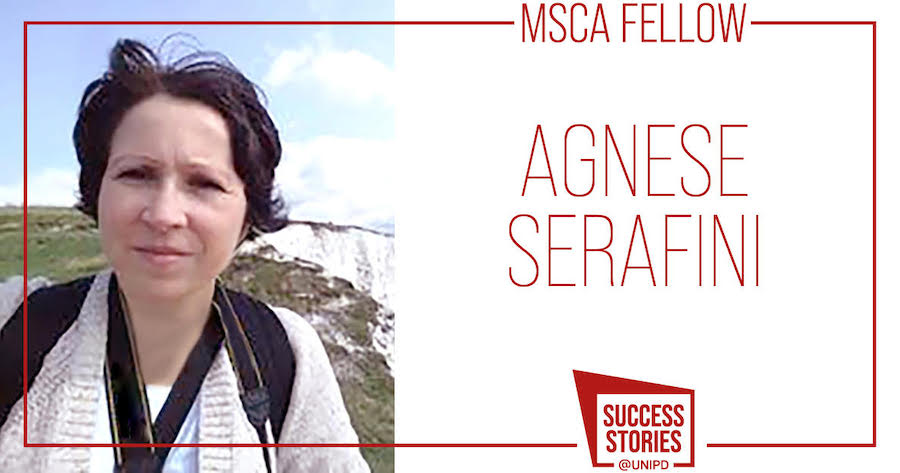
MSCA Fellow: Agnese Serafini
To grow up every day as a scientist and be a mentor for early stage researchers: according to Agnese Serafini, this is one of the greatest opportunities for a MSCA Fellow!

Agnese Serafini is specialised in the microbiology field. She studied in Rome and then moved to Padova, to the laboratory of Prof. Riccardo Manganelli, where she started working on the physiology of Mycobacterium tuberculosis, the etiological agent of tuberculosis. In 2015, she moved to London and furthered the studies on the physiology of mycobacteria.
During the MSCA Fellowship, her project will be developed at the Department of Molecular Medicine, UNIPD, under the supervision of Prof Riccardo Manganelli and at the Francis Crick Institute (London, UK) under the supervision of Dr Luiz Carvalho.
Can you briefly and simply explain what your MSCA research project is about?
My field of study is microbial physiology, in particular the physiology of Mycobacteria. The aim of my work is to explore how the variations of metal availability, like iron and manganese, affect the activity of central metabolism in M. tuberculosis and Mycobacterium abscessus. This topic falls within the broader area of studies of host-pathogen interaction. Varying the availability of metals to disturb pathogen replication is a mechanism implemented by our immune system. My research therefore contributes to understanding the mechanisms of pathogen adaptation that can be used as targets for potential future novel antibiotic therapies.
You studied and worked as postdoc in different Universities, both in Italy and in UK. What did you learn in those different environments? How did you manage to integrate the different approaches to research (if any)?
Actually, having worked abroad allowed me to learn different methodologies and approaches to science. I think that it is important to bring your past experience into your work environment and maybe even introduce new habits: just to give an example, in our laboratory I brought rigour in the organization of the lab-meetings, which used to be carried out with discontinuity and could not be fully functional to the purpose of the research group. As soon as they became more regular and participated, they really allowed a very effective exchange of ideas and improved the level of collaboration among scientists. I think that keeping up-to-date with your colleagues allows you to be better perform your everyday activities; it also raises awareness and enhances everyone's skills.
In our laboratory, there are many young researchers who want to learn; they ask me for information and opinions and I like to support them. I am one of the most senior researchers and one of those who have had more experience abroad as well. This allows me to offer advice and often a different perspective. I am very methodical in my work and I try to be the most supportive, from both a technical and scientific point of view, even without being a supervisor.
How did you meet your supervisor, Riccardo Manganelli? How did you come up together with the idea for your MSCA IF project? Did he support you in writing the project? What is his role in your project?
In 2008 I started working with Prof. Riccardo Manganelli for my Postdoc, then I moved to London but we have always been in contact. I was lucky to be able to present a MSCA-IF with Prof. Manganelli as supervisor: since we have known each other for a while, there is a mutual trust that allows me to work independently, knowing however that he is always there for support and suggestions. I believe that having a consolidated relationship with your supervisor allows you to work in synergy but also with a good independence.
What would you suggest to a researcher who is thinking about applying for a MSCA Postdoctoral Fellowship?
I believe that for a researcher the most difficult part of an MSCA-IF application is the “non-scientific” sections, for example the communication one. I would suggest getting help from the International Research Office but also advise contacting other researchers who were granted an MSCA-IF. I think that looking to exchange and compare experiences and points of view is always a good idea.
Have the current COVID 19 pandemic affected your research? How?
Of course, the covid pandemic affected my research activities yet, I must admit that, while on one hand I had to slow down all my projects, on the other I was able to find a positive side. The COVID 19 outbreak started before I won the MSCA-IF, when I was still working in a private analysis laboratory, and it gave me more time to write the MSCA project. I even managed to draw up a review on a similar topic to the one I developed in my fellowship. We can say that I wasted no time and I took advantage of this year off.
What are your plans for the future, after you finish the MSCA-IF fellowship? Should you be invited by other young scientists to act as their MSCA supervisor, would you accept? Why?
I am trying to build my independence and to lay the foundations to soon be able to carry out my research on my own. I think that the dream of every researcher is to have the opportunity to demonstrate his/her autonomy as a scientist. Also, the idea of becoming a supervisor, in the future, it's something I'd like to consider: I really love mentoring young researchers and to support them in their everyday work. It is very stimulating and it allows me to grow every day as a researcher.
International Research Office
via Martiri della libertà 8, 35137 Padova, Italy
tel. +39 049.827 1947 / 1948 / 1945
fax +39 049.827 1911
international.research@unipd.it


